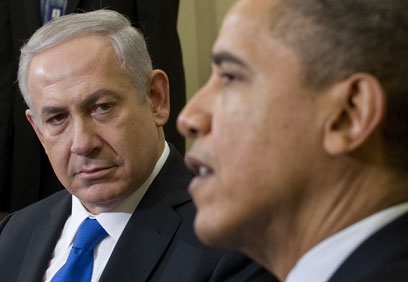Saturday 15 September 2012 - 13:51
Story Code : 5692
US media see Iran strike as transcending elections issues
NYT says leaders need 'more than red lines,' and Washington Post delves into Netanyahu's 'Hamlet-like anguishing' over strike on Iran, as Israel-Iran tensions become pivotal issue in presidential race.
As the�presidential race�in the United States gains momentum and differences between�Israel�and the US over the need of an immediate action vis-�-vis Iran's�nuclear ambitions�grows, US media levels growing criticism at Israel's demands of a "red line."
A top commentator at the Washington Post urged US President�Barack Obama�to help Prime Minister�Benjamin Netanyahu�"climb down from his unwise rhetoric"; and the New York Times asserts that "Leaders need flexibility and ambiguity, not just hard and fast red lines."
David Ignatius of the Washington Post's opinion piece, titled "Puzzled by a 'red line' demand," wonders about Netanyahu's "almost daily demands" for the US to set a clear�red line�for Iran, and asks "What does he wants beyond what President Obama has already stated?"
Ignatius said that "Obama believes he has drawn the US red line as�clearly�as a superpower ever should." He noted previous statements by Obama, saying that the US has a national security interest in preventing the Islamic Republic from achieving military nuclear capabilities.
He further notes that the Obama administration has already proved it plans to stop�Iran�by directing the US Armed forces to formulate a detailed plan of attack should Iran cross the US' line.
Ignatius hedged that Netanyahu's true aim is to see Obama issue a de-facto ultimatum or deadline for Iran to stop its nuclear enrichment.
"Watching Netanyahu�s public, Hamlet-like anguishing over the past year about 'to bomb or not to bomb,' one suspects the real issue for him isn't red lines so much as trust that they will be enforced," the Washington Post states.
The�relations�between the American president and the Israeli prime minister have often been strained and close associates on both sides say they are plagued by mutual mistrust both on a personal level and on a political one.
"Netanyahu should understand that no country can allow another to impose the conditions under which it will go to war," Ignatius wrote. "Presidents don't turn over that power of war and peace, even to their best friends."
If both the US and Israel wish to maintain deterrence vis-�-vis Iran, "Obama should help the Israeli leader to climb down from his unwise rhetoric," he states.
'No Rush to War'
The New York Times' editorial largely echoed that sentiment, further stressing that the United States should not rush to�strike�Iran, especially since there is a consensus among experts that such a strike could, at best, set the Iranian's nuclear program back four years at most.
Netanyahu, the editorial states, is "Trying to browbeat President Obama into a preemptive strike," further exacerbating the tensions between the close, long-time allies.
"Leaders need flexibility and ambiguity, not just hard and fast red lines. And it is dangerous for Mr. Netanyahu to try to push the president into a corner publicly and raise questions about Washington. Is that really the message he wants to send to Tehran?" the New York Times wondered. Israel has no reason to doubt Washington's resolve on the�Iranian threat.
But recent polls show that 70% of Americans oppose a unilateral strike on Iran, and 59% said that if a unilateral Israeli strike on Iran ignites a regional war, the United States should not come to its ally�s aid.
The editorial asserts that "The best strategy is for Israel to work with the United States and other major powers to tighten sanctions while pursuing negotiations on a deal. It is a long shot, but there is time to talk. And that�s where the focus must be."
�The Iran Project is not responsible for the content of quoted articles.
# Tags











